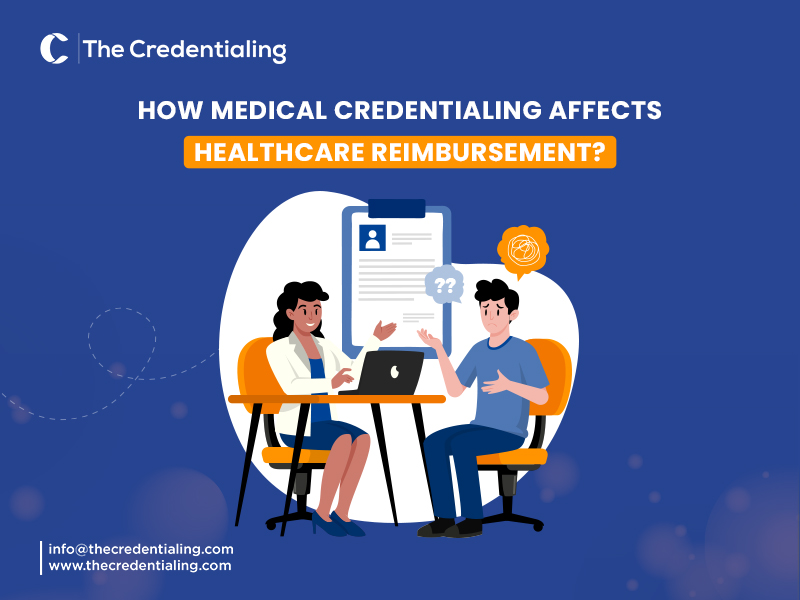How Medical Credentialing Affects Healthcare Reimbursement
Healthcare as a sector is the major contributor to a happy and healthy society. To ensure the adequacy and quality of this sector, healthcare providers are credentialed before they are allowed to serve patients. Credentialing is meant to meticulously verify the qualifications, experience, and professional standing of healthcare providers. While it may appear to be an administrative hurdle, credentialing has a significant and far-reaching impact on healthcare reimbursement. Understanding this crucial link is essential for everyone involved in the healthcare system, from providers and administrators to insurers.
The Importance of Medical Credentialing
Credentialing ensures that only qualified and competent professionals are granted the privilege to treat patients and be reimbursed by insurance companies. It is important in the following ways:
Credentialing and Insurance Contracts
One of the main ways through which Credentialing impacts reimbursement is through its role in contracting with a payer. A provider who wishes to be included in a certain insurance network must first get credentialed. Only after getting credentialed will they be deemed as “In-Network”. In-network providers are more likely to attract patients who prefer to stay within their insurance network to minimize out-of-pocket costs. Consequently, credentialed providers often see higher patient volumes, leading to increased service delivery and higher overall reimbursement from insurance companies. If you are an out-of-network provider, patients are less likely to visit your clinic, impacting your revenue. Even so, if they visit you and you provide them services, the payer will not compensate you for it since you are not enrolled with them.
Increasing Reimbursement Rates
Credentialing, along with ensuring the qualification and competitiveness of providers, is also a source of determining the reimbursement rates for their services. The qualifications, level of education, and level of experience of a healthcare professional all have a role in how much a commercial or a government will pay for your services. For instance, someone with an advanced level of education and more experience in the field of cardiology will receive higher reimbursements than someone who is new to the field.
Timeliness and Revenue Cycle Management
The credentialing process can be time-consuming, often taking several months to complete. During this period, providers may face delays in seeing patients and, consequently, delays in receiving reimbursement. Efficient revenue cycle management is dependent on the timely completion of credentialing. Delays can lead to cash flow problems, particularly for new practices or providers who are just starting out. Hence, initiating the credentialing process early and ensuring all documentation is complete and accurate is critical to maintaining financial stability.
Regulatory Compliance and Risk Management
Credentialing ensures compliance with regulatory standards, which is crucial for avoiding penalties and ensuring continuous reimbursement from government programs like Medicare and Medicaid. The requirements of credentialing compel a provider to stay compliant, as failure to do so will result in denied claims and potential audits impacting overall reimbursement. Moreover, credentialing helps mitigate risk by ensuring that only qualified and competent providers are delivering care, thereby reducing the likelihood of malpractice claims and associated financial liabilities.
Quality of Care and Reimbursement Models
The shift toward value-based care models, such as Accountable Care Organizations (ACOs) and Patient-Centered Medical Homes (PCMHs), places even greater emphasis on credentialing. These models are introduced to provide healthcare providers with rewards for delivering high-quality care while staying compliant. Proper credentialing ensures that a provider meets the criteria set forth by the regulatory bodies. Being credentialed to reputable payers is also evidence of diligence and competitiveness. On the other hand, failing to get credentialed can negatively impact quality metrics, patient outcomes, and financial incentives tied to performance.
Credentialing and Provider Reputation
An authorized provider is preferred by the patients and other providers due to the increased trust and hence patient loyalty. Word of mouth and professional recommendation are essential to have a constant flow of patients, which in turn affects revenue. Insurance companies also give preference to well-credentialed providers, and this often leads to better contract terms and conditions for the provider and guaranteeing the best reimbursement rates.
Continuous Monitoring and Re-credentialing
Credentialing is not an event that is done once; it is a process that must be constantly checked and re-credentialed to meet the current compliance and reimbursement standards. The provider status must be updated frequently, due to new certifications, changes in licensure, or involvement in malpractice cases. It is crucial to monitor these issues constantly so that any issues that may affect reimbursement can be addressed before they occur. Re-credentialing also helps the provider to check on the new standards and policies in the market and retain their place in insurance networks to protect their revenues.
